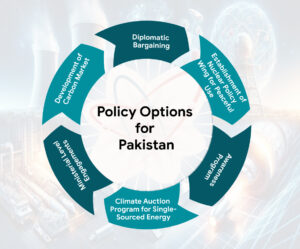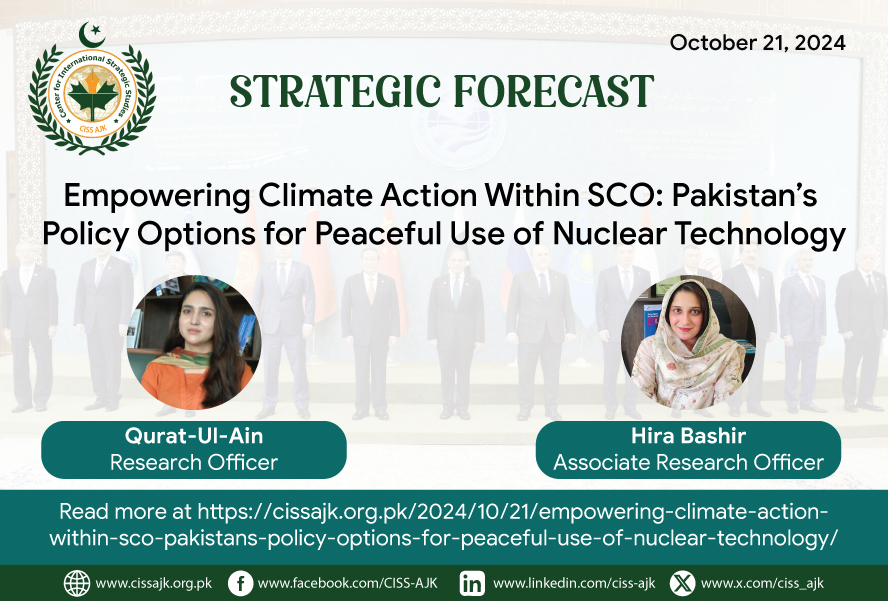Pakistan’s attainment of full membership in the Shanghai Cooperation Organization (SCO) in 2017 marked a milestone in advancing its regional cooperation and strategic partnerships. Originally established in 1996 as the Shanghai Five, the organization comprised China, Russia, Kazakhstan, Kyrgyzstan, and Tajikistan. In 2001, with the inclusion of Uzbekistan, it evolved into the Shanghai Cooperation Organization. The SCO mainly focuses on security, economics, trade and cultural ties within the region. Pakistan’s elevation to full membership occurred during the 16th Heads of State Summit in Astana, following its observer status from 2015 to 2017. This achievement is regarded as a critical strategic success, particularly in strengthening ties with two key regional powers, namely, China and Russia. Through its engagement with the SCO, Pakistan seeks to address internal challenges, including economic instability, security concerns, and social development, while enhancing its role in regional geopolitics.
Pakistan has been contending with a range of non-conventional security threats, among which climate change stands as one of the most pressing. This phenomenon has emerged as an existential challenge for the country, manifesting through a series of catastrophic events over the years. Pakistan has endured severe climatic crises, such as the devastating floods of 2010 and 2022, rapidly melting glaciers, and recurring deadly heat waves. These climate-related disasters have significantly undermined the nation’s economic stability and jeopardized food security. Given the profound impact of these issues, it is imperative that climate change be addressed with urgency at the national, regional, and international levels.
In this context, Pakistan can raise the issue of climate change through the platform of the Shanghai Cooperation Organization (SCO). By leveraging this forum, Pakistan can advocate for climate justice and call upon the Global North to assume its historical responsibility for the climate crisis. Historically, the wealthy nations of the developed world have been the largest contributors to climate change, while the resulting environmental degradation has disproportionately affected the Global South—regions that have contributed the least to greenhouse gas emissions.
Through the SCO, Pakistan can advocate for greater accountability and collaboration in addressing climate inequities, particularly those affecting vulnerable regions. For example, from 2010 to 2020, human mortality from floods, droughts, and storms was 15 times higher in regions with high vulnerability than in those with lower vulnerability. For the Global South, which faces significant adaptation challenges, pursuing climate action that accounts for these disparities is crucial. The SCO provides a unique platform for member countries to develop interconnected infrastructure for green sourced energy production. The SCO summit, which took place in Kazakhstan from July 3–4, approved a comprehensive energy cooperation strategy that would serve as a roadmap for member states through 2030. An important component of this plan involves possibility of establishing scientific and technical center for nuclear cooperation. The SCO Secretariat pledged to assist the authorized agencies of SCO member states in developing a roadmap for the implementation of this plan.
This article explores the importance of nuclear technology collaboration for Pakistan in addressing its energy needs and combating climate change. It emphasizes the need for Pakistan to adopt robust policies to efficiently harness nuclear technology for sustainable energy. For this purpose the article offers policy options to boost investment and expand the capacity of nuclear technology for green energy production.
Nuclear energy emerges as a viable solution to both meet the Pakistan’s growing energy demands and contribute to climate mitigation Nuclear power is one of the sustainable sources of energy that the world is using to combat effects caused by climate change. Compared to other forms of energy generation, nuclear energy offers significant sustainability advantages. Nuclear reactors emit no greenhouse gases during electricity generation and, throughout their life cycle, significantly produce four times less carbon than solar power.By working together, SCO countries like China, Russia, and Pakistan—each with distinct nuclear capabilities and expertise—can create synergies that advance nuclear technology’s safe and efficient use across the region.
.Pakistan has increased the contribution of nuclear energy to its national grid, reaching a record 17.4% in 2023, up from 16.2% in 2022. With an operational capacity of 3.3 GW, nuclear power remains an important component of Pakistan’s energy mix, mainly through Chinese-built reactors such as the Hualong One units in Karachi and four CNP-300 reactors in Chashma.
Nuclear power is one of the sustainable sources of energy that the world is using to combat effects caused by climate change. Nuclear reactors emit no greenhouse gases during electricity generation and, throughout their life cycle, significantly produce four times less carbon than solar power. In view of the continuous global crises on climate change and the very negative impacts of fossil power in the world today; it is now high time to embrace nuclear power.
As the table illustrates, nuclear and wind energy have the smallest CO2 emissions per kWh, 11-12 gCO2, which is much less than the emissions of coal and natural gas, which reach 820 gCO2 and 490 gCO2 kWh, respectively. This contrast clearly shows the prospects of nuclear and renewable energy sources in improving environmental efficiency in decarbonization.
Research by the IAEA revealed that a 1 GWe nuclear reactor generates 30 tons of high level solid waste in one year, even though this waste may not be treated or recycled. However, a similar 1 GWe coal power plant results in the generation of approximately 300000 tones’ of ash annually. What this means is that nuclear energy is cleaner in the sense that it discharges much less waste as compared to coal energy.
Pakistan should embrace nuclear energy as a crucial address for combating climate change and ensuring energy security. Nuclear power is a low-carbon, dependable energy source that reduces reliance on fossil fuels and helps to reduce the country’s carbon impact. Advanced technologies such as Small Modular Reactors (SMRs) and Generation IV reactors can provide long-term, efficient energy while reducing waste. To make this shift, Pakistan need strong political will, public awareness, and appropriate regulatory frameworks for safety and waste management. By incorporating nuclear energy, Pakistan could satisfy its requirements for energy while also contributing to global environmental sustainability initiatives.
Outlined below are policy options for Pakistan to address climate change and promote the peaceful use of nuclear technology.
Policy Options for Pakistan

Development of Carbon Markets: Developing carbon markets is essential for Pakistan to effectively address climate-related challenges and meet its emission reduction targets outlined in its Updated Nationally Determined Contribution (NDC) for 2021. Carbon markets, which enable the trading of carbon credits, offer a cost-efficient method for reducing greenhouse gas emissions. By tapping into these markets, Pakistan can facilitate its 60% shift towards renewable energy, afforestation efforts, and 30% transition to electric vehicles as outlined in its NDC.
Carbon Markets offer financial incentives to businesses who engage in cleaner technologies and emission-reducing projects. They can also encourage private sector investment.
This mechanism can accelerate Pakistan’s climate action by driving the adoption of renewable energy, energy efficiency, and other sustainable practices. Furthermore, carbon markets promote international cooperation, allowing countries to collectively work towards global emission reduction goals. However, to effectively utilize carbon markets, Pakistan must ensure robust market design, environmental integrity, and equity to avoid disadvantaging vulnerable communities and ensure that the carbon credits truly represent additional emissions reductions.
Diplomatic Bargaining: To effectively conduct diplomatic bargaining for the transfer and investment in nuclear technology for climate-related purposes, Pakistan should leverage its longstanding alliances and strategic partnerships, particularly with countries like China, Iran, and Saudi Arabia. Given China’s historical role as a major provider of nuclear technology since the 1970s, Pakistan can strengthen this partnership to explore nuclear energy solutions that specifically address climate challenges, such as clean and reliable energy production.
Despite Pakistan’s non-signatory status to the Nuclear Non-Proliferation Treaty (NPT) due to its weapons program, which restricts its access to international nuclear trade, the country can emphasize the peaceful, civilian nature of its nuclear aspirations for climate resilience. By framing nuclear technology as a key component of its climate strategy, Pakistan can seek collaborations focused on sustainable energy production. In doing so, it should underline how nuclear energy can reduce greenhouse gas emissions, align with international climate goals, and foster regional stability by addressing energy shortages.
Increasing support for nuclear technology transfer under climate-friendly frameworks should be a part of diplomatic efforts; this might be done by attracting the attention of international organizations and regional neighboring countries concerned with regional climate resilience. Pakistan could specifically push for agreements that highlight the broader climatic benefits of nuclear energy while separating civilian nuclear cooperation from strategic considerations. By presenting nuclear energy as a means of regional climate adaptation, Pakistan might strengthen its negotiating position by interacting with countries that have a stake in climate action, such as those in the Shanghai Cooperation Organization (SCO).
Establishment of Nuclear Policy wing for Peaceful Purposes: Establishing an additional “nuclear policy wing for peaceful purposes” within its energy and environmental governance framework could be a crucial step in order to enhance its climate resilience. This dedicated institution would concentrate on developing legislation and regulations for the development and use of nuclear energy only for peaceful, civilian uses, like scientific research, energy production, and medical applications. The policy wing would give Pakistan clarity in its commitment to address urgent energy shortages and further its climate goals.
The Use of Nuclear Policy in a Peaceful Way Wing would be in charge of describing the extent, safety procedures, and environmental factors related to nuclear energy projects. To guarantee the safe and responsible use of nuclear materials, this involves creating regulatory standards that correspond with global best practices. To help ensure adherence to international nuclear safety and security standards, the wing would also collaborate closely with international nuclear organizations including the International Atomic Energy Agency (IAEA). By assuring prospective partners that Pakistan’s nuclear goals are solely peaceful, this partnership will increase Pakistan’s credibility when it comes to pursuing nuclear technology transfers and funding for climate-friendly initiatives.
Awareness programs: Pakistan should start awareness campaigns encouraging the research on peaceful application of nuclear technology in energy, healthcare, and agriculture in partnership with the IAEA’s Peaceful Uses Initiative (PUI). These programs have the potential to draw in scientists, improve public awareness, and establishing Pakistan as a pioneer in climate resilience and sustainable development. By demonstrating the advantages of nuclear technology, the initiatives can boost R&D spending and foster public confidence in nuclear energy.
Single sourced energy and Climate Auction Program: Pakistan generates its electricity from a variety of sources. Pakistan should focus its energy production strategy on a single reliable source and boosting investments in that field to promote a greater dedication to nuclear technology. Such green investments can be effectively funded through World Bank climate auction program. There are three primary parts to this model: In order to maximize the impact of public funds, it first creates price guarantees for future climate results through auction, where competitive bidding establishes the minimum price the private sector requires. Second, money are only disbursed following independent confirmation of climatic results, guaranteeing observable progress before to payouts. Last but not least, this approach divides risk between the public and private sectors.
Ministerial level engagement: Effective implementation of above mentioned policy options requires involvement at the ministerial level, with the Ministry of Planning, Development & Special Initiatives and the Ministry of Climate Change and Environmental Coordination playing key roles. These two ministries ought to be capable of creating, organizing, and carrying out a thorough policy framework that addresses climate change. A unified approach to climate-related projects will be ensured by enhancing their capabilities and encouraging cooperation amongst them, allowing Pakistan to take advantage of opportunities such as the World Bank’s climate auction programs and other funding sources for sustainable development.
Authors
Qurat-Ul-Ain Shabbir, Research Officer at Center for International Strategic Studies AJK.
Hira Bashir, Associate Research Officer at Center for International Strategic Studies AJK


